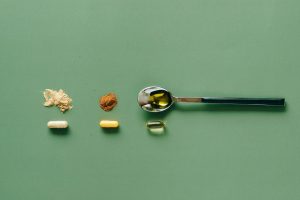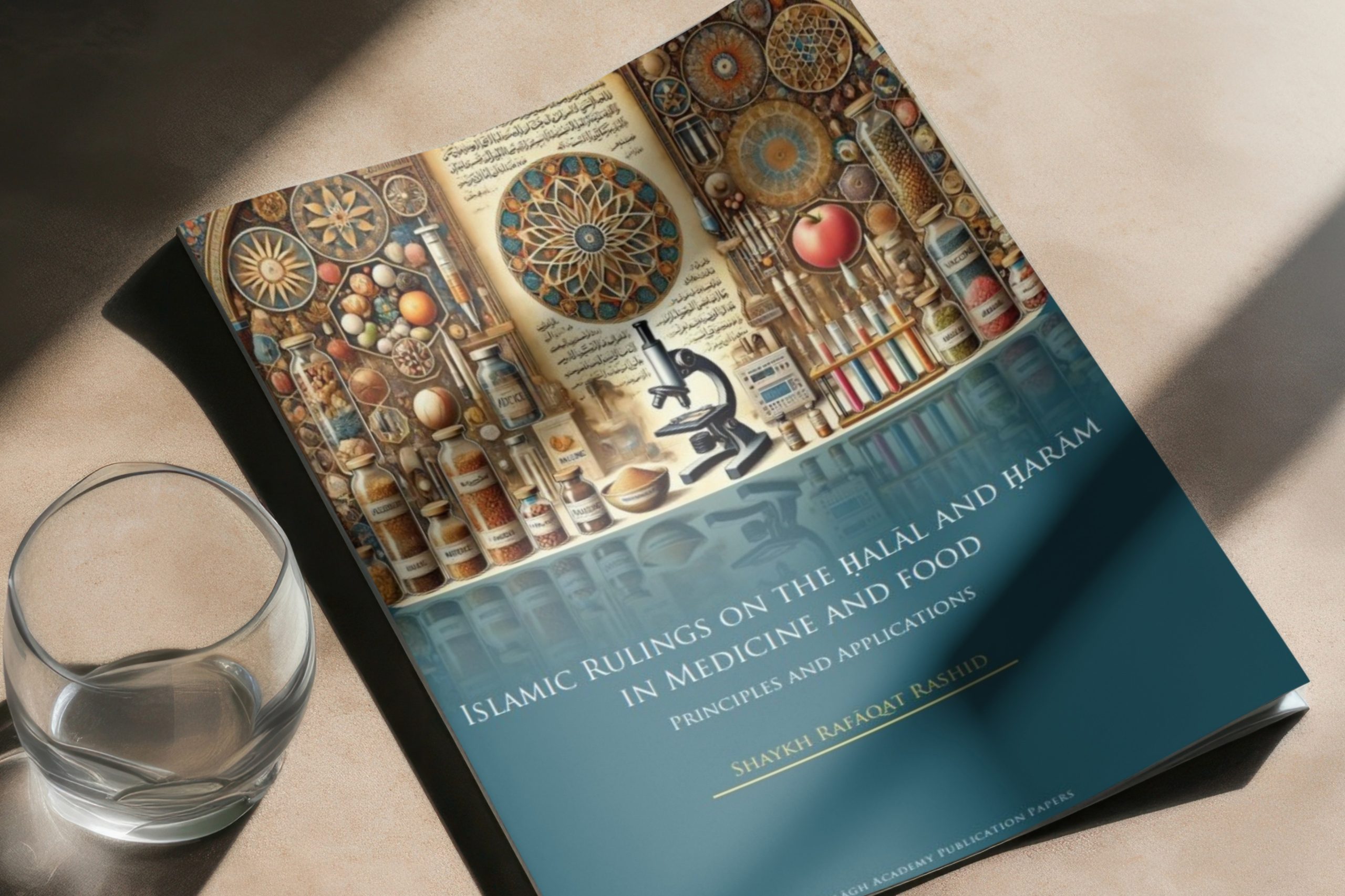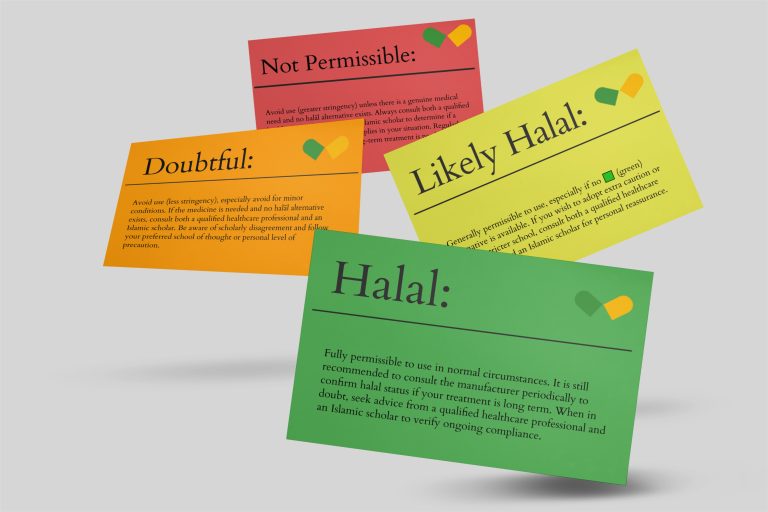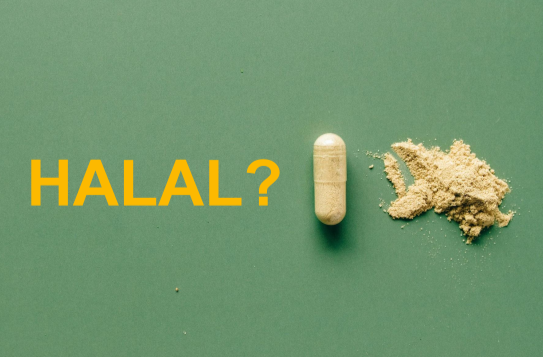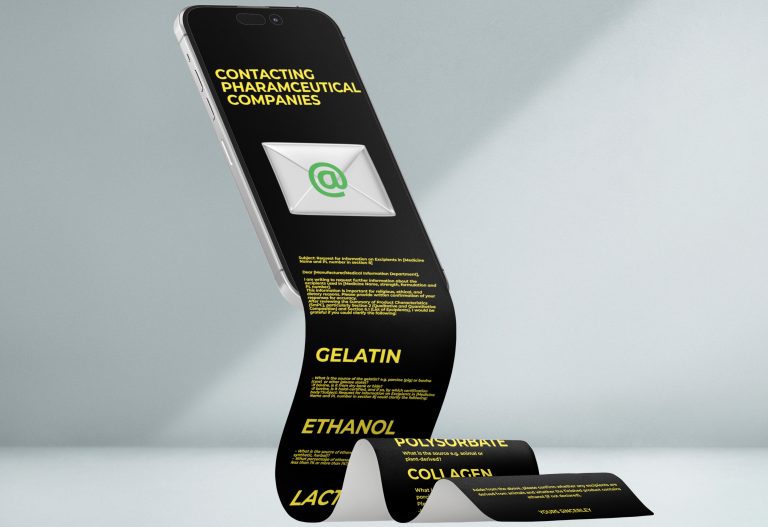Collagen in medicines: additional Islamic information
| Source | Hanafi | Maliki | Shafiʿi | Hanbali |
|---|---|---|---|---|
| Bovine (cow) collagen from dead Islamically slaughtered cows | ✅ Pure and permissible for consumption | ✅ Pure and permissible for consumption | ✅ Pure and permissible for consumption | ✅ Pure and permissible for consumption |
| Bovine (cow) collagen other than from bone in dead un-Islamically slaughtered cows | ✅ Pure and permissible for consumption | ❌Legally impure; haram to consume. All parts of the dead animal is impure; this includes collagen from bone. | ❌Legally impure; haram to consume. Bones are considered impure. | ❌Legally impure; haram to consume. Bones are considered impure. |
| Bovine (cow) collagen from other than bone and hide (i.e. tallow/cartilage/tendon) in dead un-Islamically slaughtered cows | ❌Legally impure; haram to consume | ❌Legally impure; haram to consume | ❌Legally impure; haram to consume | ❌Legally impure; haram to consume |
| Bovine (cow) tanned* or chemically treated hide/skin | ❌Pure-but cannot be consumed. Tanned cow hide/skin is considered pure and permissible to use but not for consumption. Hanafi scholars accept both chemical tanning (dabgh al-ḥaqīqī) and exposure to sun/dust (dabgh al-ḥukmī) for purification. purification. | ❌Legally impure-haram to consume | ❌Pure but cannot be consumed. Tanned cow hide/skin is considered pure and permissible for use but not for consumption. Shafiʿi scholars accept only chemical tanning (dabgh al-ḥaqīqī) for purification | ❌Legally impure-haram to consume. |
| Porcine (pig) | ❌Haram | ❌Haram | ❌Haram | ❌Haram |
| Fish | ✅ Halal | ✅ Halal | ✅ Halal | ✅ Halal |
| Chicken slaughtered Islamically | ✅ Halal | ✅ Halal | ✅ Halal | ✅ Halal |
| Chicken slaughtered non-Islamically | ❌Legally impure; haram to consume except from bone | ❌Legally impure; haram to consume | ❌Legally impure; haram to consume | ❌Legally impure; haram to consume |
* Tanning process – the process that treats the collagen in animal skin and hides with a chemical agent to make leather1
In summary, collagen derived from Islamically slaughtered cows or chickens is considered pure and halal according to all schools of thought. Collagen derived from non-Islamically slaughtered cows and chickens is haram and legally impure according to all schools of thought with the exception of the Hanafi school which considers bovine (cow) collagen halal from bone even if slaughtered non-Islamically on the condition that there is no blood or moisture. Fish derived collagen is halal and porcine (pig) derived collagen is haram according to all four schools of thought.2
Topical Collagen (Medical and Cosmetic Use)
In Islamic law, the ruling for topical use differs from ingestion because it involves external application to the skin, not eating or nutritive absorption.
Tanning (Dibāgh) and Purity
The Prophet ﷺ said: “Any impure hide that has been tanned is purified.”
Tanning (dibāgh) removes the moisture and blood that cause impurity, making the material pure for external use but not permissible for consumption. Pig and human skins remain intrinsically impure (najis al-ʿayn).
Views of the Sunni Schools
- Ḥanafī: Tanning purifies the skins of all animals except pig and human. Tanned hides are pure and may be used externally.
- Shāfiʿī: Tanning purifies if it fully removes residual fluids (dabgh al-ḥaqīqī). Pig and dog skins remain impure.
- Mālikī: Tanning does not make impure skins ritually pure, but dry, non-moist uses are tolerated.
- Ḥanbalī: Tanning purifies if it fully removes residual fluids (dabgh al-ḥaqīqī). Pig and dog skins remain impure.
Modern Application
In modern medicine, collagen and skin graft materials undergo extensive chemical purification and preservation. These industrial processes remove blood and moisture (dabgh al-ḥukmī) and stabilise the material under exposure to moisture, achieving the same outcome as dabgh al-ḥaqīqī described by classical jurists.
Because these treatments eliminate decay and impurity, such materials are generally considered pure and permissible for topical medical use (for example, wound coverings or grafts), except when derived from pig sources, which remain haram and impure in all schools.
<— go back to ‘Collagen in medicines’ page
⚠️ Important messages for patients
- Always take or use your medicine(s) exactly as directed or prescribed by your healthcare professional (HCP), such as your doctor or pharmacist
- Do not stop, delay, change or alter the way you take or use your medicine(s) without first discussing it with the HCP who prescribed or supplied it to you
- Always consult your HCP if you have any questions or before making any decisions about your treatment
- For Islamic guidance, seek advice from your local Imam or a trusted Islamic scholar – ideally someone with relevant knowledge and expertise in the fiqh (Islamic rulings) of medicines
- Use the information gathered to make an informed decision together with your HCP and, if needed, your local Imam or trusted Islamic scholar
Disclaimer
- This resource is for educational purposes only. It does not constitute clinical, medical, or professional healthcare advice and should not replace individual clinical judgement or qualified religious guidance
- Always consult your doctor, pharmacist, or other healthcare professional regarding your own medical conditions or for advice on treatment options
- Healthcare professionals remain fully responsible and accountable for decisions made within their own scope of practice.
References
- Benedict Nnachi Alum (2024). Tannins and Leather: Chemistry, Tanning Processes, and Environmental Impacts. NEWPORT INTERNATIONAL JOURNAL OF SCIENTIFIC AND EXPERIMENTAL SCIENCES, 5(3):33-37. https://doi.org/10.59298/NIJSES/2024/10.5.333337 ↩︎
- Rashid, R. (n.d.). Islamic rulings on the ḥalāl and ḥarām in medicine and food: Principles and applications. Al Balāgh Academy Publication Papers. ↩︎



